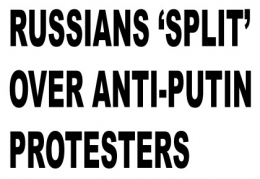Feminist punks sentenced to two years for ‘hooliganism motivated by religious hatred’
THE RUSSIAN community in Ireland is “split” on the controversial two-year jail term imposed in the Russian courts on three members of the feminist punk group Pussy Riot.
Sergey Tarutin, publisher of Russian language newspaper Nasha Gazeta in Dublin, told Metro Éireann that some Russians believe the imposition of a prison sentence was harsh, while others think it wasn’t punishment enough.
The latter view would be particularly strong among some Orthodox Christians who “if they had their way would put all three girls into the fire”, reflected Tarutin.
The three jailed members of Pussy Riot were arrested in Moscow last February after an unauthorised performance of a ‘punk prayer’ at the city’s Christ the Saviour Cathedral.
During their act, which was performed at the altar, the women called on the Virgin Mary to deliver Russia from leader Vladimir Putin.
Nadezhda Tolokonnikova (22), Maria Alyokhina (24) and Yekaterina Samutsevich (30) were convicted of hooliganism motivated by religious hatred and have now lodged an appeal.
Tarutin said that, from a personal standpoint, a prison sentence was over-the-top, but underlined that most Russians agree that some form of penalty, such as community service, would have been merited.
He also expressed scepticism about the actions of the fledgling group, which was little known just a few months ago.
As to the Irish Government’s position, a Department of Foreign Affairs and Trade spokesperson told Metro Éireann the decision to impose a prison sentence is “a matter of great regret and deep concern”.
The spokesperson added that while the actions of Pussy Riot were “ill-judged”, the prison sentence appeared “out of proportion to the offence caused, especially since the defendants have spent the last five months in custody”.
The spokesperson described as “noteworthy” the fact that concern had been expressed about the conduct of the trial and the risk of a prison sentence “by people with diverse views and backgrounds: Russians and non-Russians, religious believers and non-believers, supporters and opponents of President Putin.”
She said Ireland “shares” the concerns expressed by many, including EU High Representative Catherine Ashton.
In her statement, the EU diplomat described the sentence as “disproportionate” and expressed her expectation that “this sentence will be reviewed and reversed in line with Russia’s international commitments”.
Meanwhile, the Russian Embassy in Dublin issued no response to Metro Éireann on the recent protest on the issue by Amnesty International Ireland.
But an Amnesty spokesman expressed hope that international pressure was having an impact.
“There are signs that the Kremlin realises it has made a mistake with Pussy Riot – and may seek to get the band released early,” he said. “The head of the president’s Human Rights Council, Mikhail Fedotov, said recently that the court’s ruling was a legislative mistake which should be corrected on appeal.”
The saga is set against the recent re-election of President Putin following the biggest protests against his 12 years in Russia’s seat of power.












